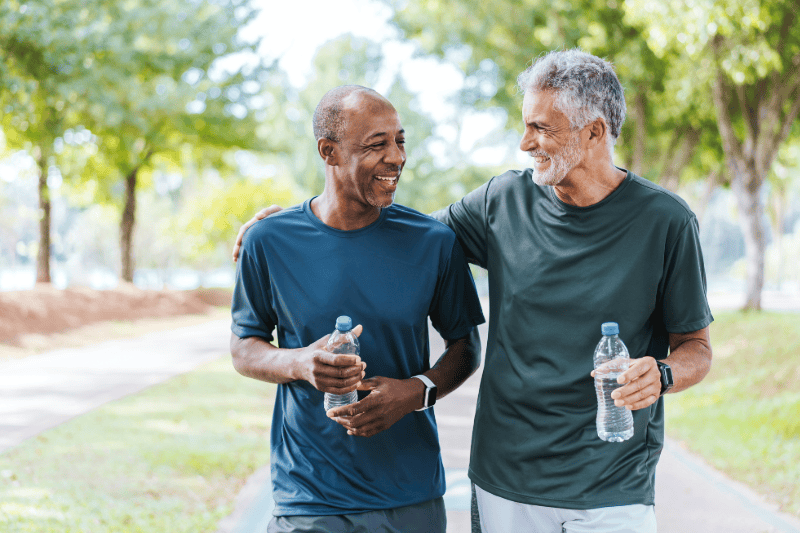How to prevent this common condition
Dehydration is a common problem, running rampant among Americans. The National Institutes of Health indicates that around 75% of Americans are chronically dehydrated – and among them, 17 to 28% of older adults are dehydrated.1
Lack of hydration, though sometimes difficult to detect, can affect your health. What can you do to ensure you’re taking in enough water?
There is some confusion as to how much water adults need each day. Although you may hear that you should drink eight glasses of water per day, the National Academies of Science, Engineering and Medicine say the standard should be around eight to 10 glasses per day.2
Why older adults are more prone to dehydration
Our bodies are always losing water, through the lungs, skin, kidneys and gastrointestinal tract. Dehydration occurs when water loss exceeds water replacement. There are four major factors that lead to dehydration as you age:
- Less water reserves: Your body’s fluid reserves shrink as you get older. This means you don’t carry as much water in your body, according to the Cleveland Clinic.3 Without constant replenishment, you can easily become dehydrated.
- Decreased kidney function: Kidney function can decline with age, and this means that more water may be lost through urination. This can also lead to kidney stones, urinary tract infections and other illnesses.4
- Diminished sense of thirst: Normally, when you begin to get dehydrated, you become thirsty. But, as you age, that sense diminishes, according to the Cleveland Clinic. Because of that, many seniors don’t drink enough liquids to stave off dehydration. In fact, it’s a common cause of hospitalization among seniors.5
- Illnesses and use of medications: Many older adults have conditions or take medications that increase their risk of dehydration, including chronic illnesses like untreated diabetes or kidney diseases. Even minor illness like a cold or sore throat can drain your water. Also, taking medications such as diuretics will cause dehydration.6
Symptoms of dehydration
Severe dehydration in older adults may cause shriveled skin, low blood pressure and delirium. There is a quick, simple test you can take to check for dehydration, according to Dispatch Health.7 Pinch the skin on the back of your hand and watch how quickly it returns to normal. If it snaps back immediately, you’re likely safe. If it remains in a tented shape for a second or two, that’s a sign that you may be dehydrated.
Other more severe symptoms can include headache, confusion, dizziness, dry, sticky mouth, extreme thirst, fatigue, less frequent urination and muscle cramping.
How to prevent dehydration
In order to avoid dehydration, please consider the following tips:8
- Drink water throughout the day. If you don’t like plain water, try adding a squeeze of lemon or lime to add flavor.
- Eat foods with high water content. Examples include celery, cucumbers, fruits, melons and low-sodium broths or soups.
- Increase water intake as needed. If you’re going to be outdoors or in humid conditions, or are exercising, drink more water.
- Respond to any illnesses. Take more fluids if you’re ill with diarrhea, fever or vomiting. You can be losing more fluid than you’re taking in.
- Try other liquids. You can try milk, sparkling water and low-sugar fruit juices. Coffee and tea contain caffeine which can have diuretic effects.
Build hydration into your routine and consistently sip throughout the day, particularly when the temperatures start to climb on hot days. Have a mug, tumbler or water bottle always on hand for easy access. If you’re unsure of your hydration needs, talk to your doctor to find out how much water you should be drinking each day.
References
1 Weinberg AD, Minaker KL. Dehydration. Evaluation and management in older adults. Council on Scientific Affairs, American Medical Association. JAMA. 1995 Nov 15;274(19):1552-6.
3 https://my.clevelandclinic.org/health/diseases/
4 https://www.healthline.com/health/symptoms-of-dehydration-in-elderly#causes
6 https://www.mayoclinic.org/diseases-conditions/-dehydration/symptoms-causes/syc-20354086
7 https://www.seniorlifestyle.com/resources/blog/preventing-dehydration-elderly/
8 https://www.healthline.com/health/symptoms-of-dehydration-in-elderly#prevention

